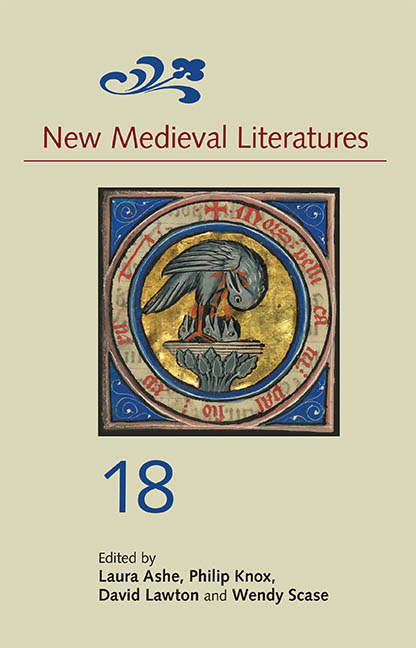Book contents
- Frontmatter
- Contents
- List of Illustrations
- List of Abbreviations
- 1 Arachnophobia and Early English Literature
- 2 Demonic Daydreams: Mind-Wandering and Mental Imagery in the Medieval Hagiography of St Dunstan
- 3 The Songs of Godric of Finchale: Vernacular Liturgy and Literary History
- 4 Sympathy for the Demon: Affective Instruction in the Katherine Group
- 5 Peynte it with Aves: Langland's Hawks, covetise, and Hugh of Fouilloy's Aviarium
- 6 Similes We Cure By: The Poetics of Late Medieval Medical Texts
- 7 The Life of Job: Bible Translation, Poem or Play?
6 - Similes We Cure By: The Poetics of Late Medieval Medical Texts
Published online by Cambridge University Press: 03 July 2019
- Frontmatter
- Contents
- List of Illustrations
- List of Abbreviations
- 1 Arachnophobia and Early English Literature
- 2 Demonic Daydreams: Mind-Wandering and Mental Imagery in the Medieval Hagiography of St Dunstan
- 3 The Songs of Godric of Finchale: Vernacular Liturgy and Literary History
- 4 Sympathy for the Demon: Affective Instruction in the Katherine Group
- 5 Peynte it with Aves: Langland's Hawks, covetise, and Hugh of Fouilloy's Aviarium
- 6 Similes We Cure By: The Poetics of Late Medieval Medical Texts
- 7 The Life of Job: Bible Translation, Poem or Play?
Summary
A man who urinates as the ‘eues (gutters) of an house dropiþ’ faeces that look like ‘þe shauyng of parchemyn’ a head wound that resembles a ‘spynand webbe blewe or ellys rede’ or ‘a burbyl of water when þat it raynes’ and ‘a man þat herith in hys ere / As hornys blewe or thonder were’: where do all of these striking similes come from? From recipe collections of one variety or another, whether these be translations of scholastic texts, vernacular remedy books or vernacular verse remedies. And yet these instructional texts have traditionally been depicted by scholars as devoid of any imaginative labour or poetic skill, as blandly or singularly utilitarian. For example, after exploring the problems inherent in cataloguing and indexing medical recipes, Henry Hargreaves nonchalantly proclaimed that the texts ‘have, of course, not the slightest scintilla of literary interest’. It is my contention in this essay, however, that it is this very kind of practical text that can help us to form a more nuanced understanding of the nature – or natures – of poetic language in the Middle Ages.
As the editors Frank Grady and Andrew Galloway note in their introduction to a recent essay collection, medievalists have long been concerned with what constitutes the literary. However, only in recent years have critics begun to ask whether medieval practical writings can be considered to be at all poetic. Often they have done so by focusing upon the aesthetic and imaginative qualities of individual texts or manuscripts, or by analysing a wide variety of different poetic features in a selection of texts from different traditions of practical writing. These studies have been invaluable for foregrounding the question of poetic practicality and for introducing different text-types and analytical methods which might lead to fruitful future study. However, to date, there has been little in-depth work on the use of specific literary features in specific forms, such as the medical recipe.
On the other hand, in the last decade, there has been no shortage of scholars reflecting upon the importation of medical language and phenomena into other types of discourse – political, devotional or poetic – in order to represent different kinds of experience.
- Type
- Chapter
- Information
- New Medieval Literatures 18 , pp. 183 - 210Publisher: Boydell & BrewerPrint publication year: 2018

